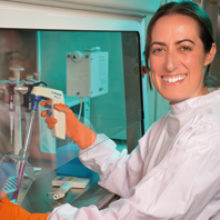Membership Q&A
Issue: HIV and AIDS
06 November 2018 article

This is a regular column to introduce our members. In this issue, we’re pleased to introduce Karen Buttigieg.
Where are you currently based?
I work for Public Health England, at Porton Down.
What is your area of specialism?
Viruses.
And more specifically?
I lead the National Collection of Pathogenic Viruses. We supply viruses to the scientific community all over the world for biomedical research and diagnostic development. It’s important that scientists work with quality reagents that they can rely on, so as not to lose time and money trouble-shooting unnecessarily, or coming to the wrong conclusions.
My role is very varied. I’m responsible for predicting which viruses are likely to be in demand; encouraging scientists to deposit new isolates into the Collection; prioritising different projects; ensuring work is carried out safely, and that records are kept proving this; setting up systems to ensure the quality of the products; responding to customers’ technical enquiries; managing the team and enabling their personal development.
Tell us about your education to date, and where did your interest in microbiology come from?
After finishing school, I studied Biology at Southampton University. My first ‘proper job’ was at Imperial College in London, in HIV research. I moved back to Southampton to work in cancer research, but there I realised that actually I wanted to work on viruses again, but without doing a PhD at that stage. So I funded myself to complete an MSc in Molecular Biology and Pathology of Viruses at Imperial College. I really enjoyed the course, and got a published paper from my project. That gave me the confidence to go for a PhD, also at Imperial. My MSc and PhD both involved making recombinant poxviruses to study transgene function. After my PhD I started working at what is now Public Health England, setting up a recombinant poxvirus capability to develop vaccines for emerging diseases.
What are the professional challenges that present themselves, and how do you try to overcome them?
Finding time to do everything. And Civil Service bureaucracy can slow things down. I stay calm and have a lot of patience. I’m quite autonomous in choosing which tasks to do each day, so I can be flexible if priorities change. I also have great colleagues, so it feels like I’m part of a team.
What is the best part about ‘doing science’?
That there is an ethos of excellence, integrity and honesty. I love the sense of doing something that no one else has done before. Of making even a small contribution to improving lives somewhere. That I’m always learning, even if it’s simply the result of the latest experiment.
Who is your role model?
I don’t have one. I prefer to be my own person and just do my best.
What do you do to relax?
When I get the chance, I enjoy playing strategic board games with friends, such as ‘7 Wonders’, or of course ‘Pandemic’. I’ve recently started enjoying gardening too.
What one record and luxury item would you take to a desert island?
Rackwick Bay by Phamie Gow. I had this playing during the birth of my first child so it would remind me of my family. And cake.
Tell us one thing that your work colleagues won’t know about you.
I bought my first house when I was 19.
If you weren’t a scientist, what would you be?
Probably a vet.
If you would like to be featured in this section or know someone who may, contact Paul Easton, Head of Membership Services, at [email protected].
Image: Karen Buttigieg
